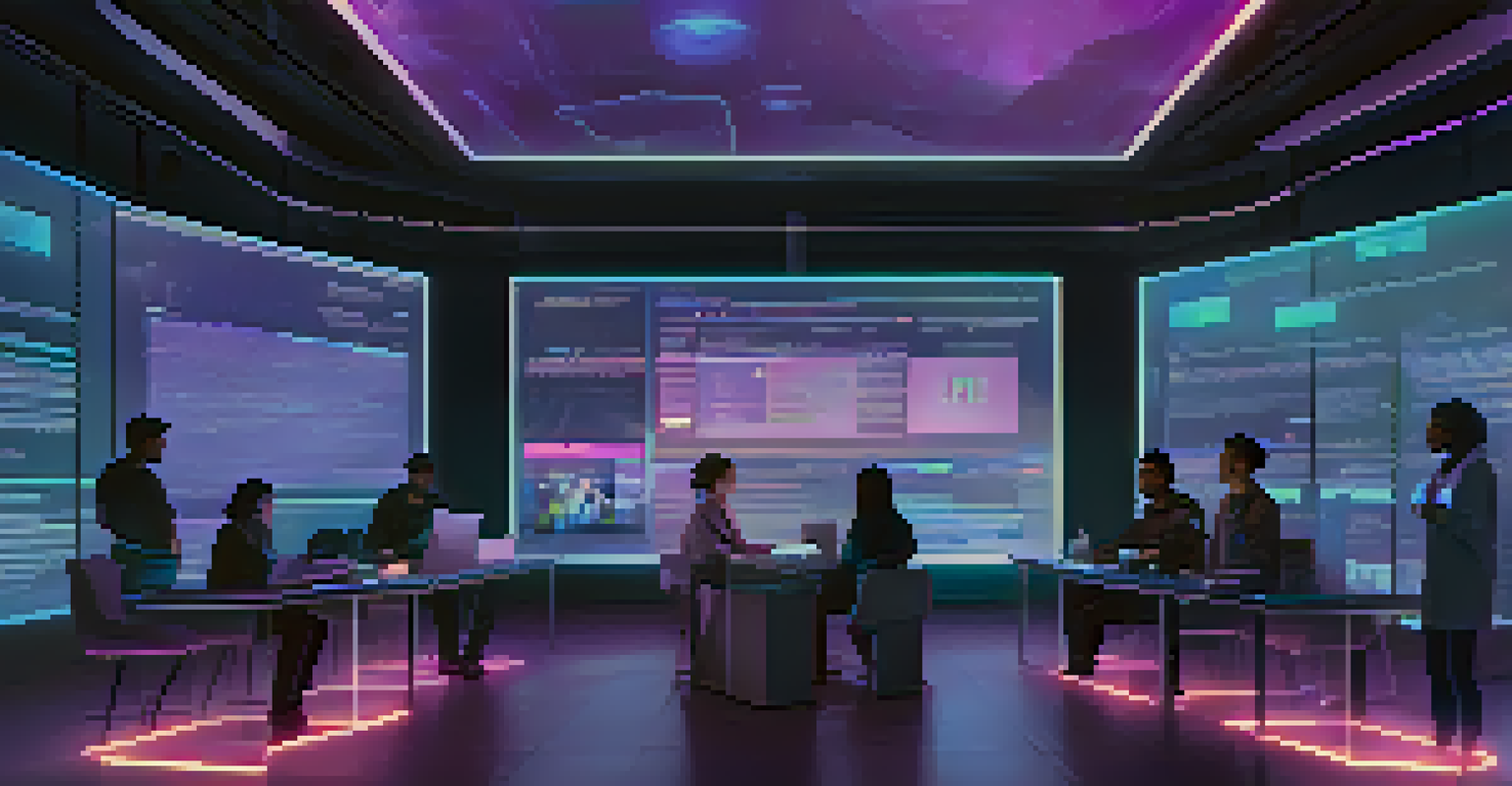Decentralized Autonomous Organizations in Ethereum

What Are Decentralized Autonomous Organizations (DAOs)?
Decentralized Autonomous Organizations, or DAOs, are essentially digital entities that operate through smart contracts on the blockchain. Unlike traditional organizations, DAOs are not governed by a centralized authority; instead, they rely on consensus among their members. This structure allows for transparent decision-making and a more democratic approach to management.
The great thing about a DAO is that it's a new paradigm for organizing people and resources.
Imagine a group of friends deciding where to eat dinner. Instead of one person making the call, everyone votes on their preferred restaurant using a simple app. In a similar way, DAOs let members propose and vote on actions, ensuring that everyone's voice is heard in the decision-making process. This collective governance is a core principle of DAOs.
DAOs are particularly significant in the Ethereum ecosystem, where they leverage the blockchain's capabilities to automate and enforce rules without intermediaries. This not only increases efficiency but also builds trust among participants, as all transactions and decisions are recorded on a public ledger.
How DAOs Function in the Ethereum Ecosystem
At the heart of a DAO is its smart contract, which encapsulates the organization's rules and governance structure. When members want to take action, such as funding a project or making an investment, they submit proposals to the DAO. These proposals are then subject to voting, where members can express their support or opposition.

Once a proposal receives enough votes in favor, the smart contract automatically executes the decision, eliminating the need for a middleman. This self-executing nature of DAOs not only streamlines processes but also reduces the risk of human error or biased decision-making. Picture it like a vending machine: you make a selection, and it delivers what you've chosen without anyone needing to intervene.
DAOs Enable Democratic Governance
Decentralized Autonomous Organizations allow members to propose and vote on decisions, fostering a more democratic and transparent management structure.
Moreover, the transparency provided by the blockchain means that all members can track the organization’s activities in real-time. This level of visibility fosters accountability and encourages active participation among members, further enhancing the democratic ethos of DAOs.
Benefits of Decentralized Autonomous Organizations
One of the main advantages of DAOs is their ability to democratize decision-making. Every member has a say, which can lead to more diverse perspectives and innovative solutions. This collaborative approach can be especially beneficial for projects that thrive on creativity and collective intelligence.
DAOs will be the backbone of the future decentralized economy, allowing for collective decision-making and resource management.
Another key benefit is the reduction of overhead costs. Traditional organizations often require a significant amount of resources for administration and governance. With DAOs, many of these processes are automated through smart contracts, allowing funds to be allocated more efficiently to projects that matter most to the community.
Additionally, DAOs can operate 24/7 without the constraints of traditional business hours. This means that decisions can be made and executed at any time, accommodating members from different time zones. It’s like having a global team that can react and adapt swiftly to changes and opportunities in real-time.
Challenges and Risks of DAOs
Despite their many benefits, DAOs are not without their challenges. One significant concern is the potential for vulnerabilities in smart contracts. If a smart contract has a flaw, it could be exploited, resulting in financial losses or even the collapse of the organization. This is akin to a bank with a security breach, where sensitive data and funds could be compromised.
Another challenge is achieving genuine participation from members. In many cases, only a small percentage of DAO members actively engage in voting and discussions. This phenomenon, often referred to as 'voter apathy,' can lead to decisions that don't reflect the will of the majority, undermining the very democratic nature of DAOs.
Smart Contracts Streamline Operations
The use of smart contracts in DAOs automates processes, eliminating the need for intermediaries and reducing the risk of human error.
Finally, regulatory uncertainty poses a risk to DAOs, as governments around the world continue to grapple with how to classify and regulate these decentralized entities. The evolving legal landscape can create confusion and potential hurdles for DAOs operating across different jurisdictions, much like navigating a maze without a map.
Real-World Examples of DAOs
There are several prominent DAOs that illustrate the potential of this governance model. One of the most well-known is MakerDAO, which manages the DAI stablecoin. In MakerDAO, holders of MKR tokens can vote on critical decisions, such as changes to risk parameters, ensuring the stability of DAI through community consensus.
Another example is the MolochDAO, created to fund Ethereum development. This DAO allows members to propose grants and fund development projects that benefit the Ethereum ecosystem. By pooling resources and collectively deciding on funding, MolochDAO has become a crucial player in supporting innovation within the blockchain space.
These real-world applications showcase how DAOs can effectively manage resources and make impactful decisions, all while adhering to the principles of decentralization and transparency. They serve as a testament to the power of community-driven initiatives in the rapidly evolving landscape of blockchain technology.
The Future of DAOs in Ethereum
As the Ethereum ecosystem continues to grow, the future of DAOs looks promising. With advancements in technology and increasing interest in decentralized governance, we can expect to see more innovative DAO models emerge. These new models may address current limitations and offer even greater efficiency and inclusivity.
Moreover, the integration of DAOs with other DeFi (Decentralized Finance) applications could lead to the creation of comprehensive ecosystems where users can participate in governance, lending, and earning rewards all within a single platform. Imagine a virtual city where citizens have a say in the laws, contribute to communal projects, and benefit from shared resources.
Participation and Engagement Challenges
Despite their advantages, DAOs face challenges related to member engagement and the potential risks associated with smart contract vulnerabilities.
Additionally, as regulatory frameworks evolve, DAOs may gain more legitimacy and recognition, attracting a broader audience. This could lead to increased investment and participation, ultimately transforming how organizations operate and engage with their communities in the digital age.
Getting Involved with DAOs
If you're interested in getting involved with DAOs, the first step is to educate yourself about the various options available. There are numerous DAOs focused on different sectors, from art and culture to technology and finance. Researching these organizations will help you find one that aligns with your interests and values.
Once you've identified a DAO, you can typically join by acquiring its governance tokens, which often serve as a key to participate in voting and proposals. Think of it like joining a club: your membership grants you the ability to contribute to discussions and influence decisions that matter to you.

Finally, actively participate in the community by engaging in discussions, voting on proposals, and contributing your skills. Your involvement not only helps shape the direction of the DAO but also enriches your own experience as you connect with like-minded individuals in the decentralized space.